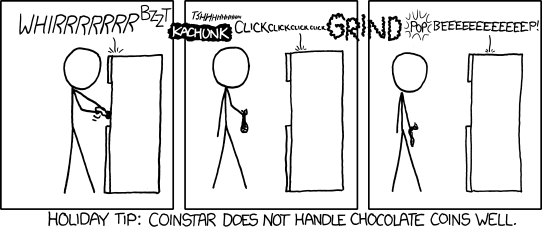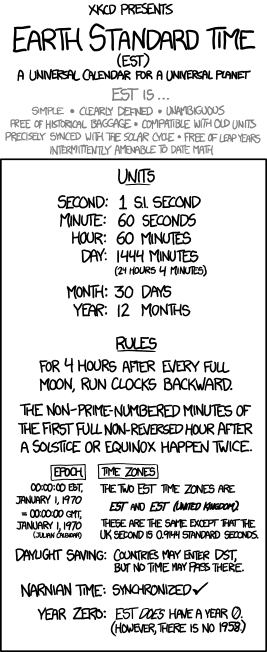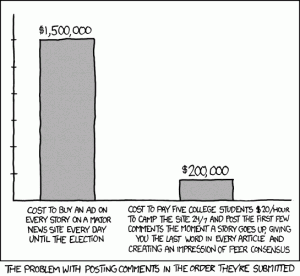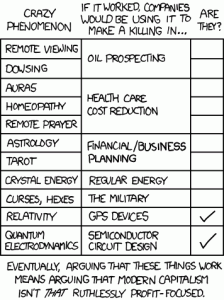I mean, everybody knows that you can’t synchronize Narnian time. Don’t laugh; Randall Munroe’s probably getting flack for that in the forums… nope, they’re instead standing up for the year 1958. Which was… a surprisingly good year for B-films.
Tag: xkcd
I’d make a video of this…
…only I don’t have a suitable audio instrumental track to sync to it.
#rsrh xkcd gets a rare one wrong.
There is a problem with this argument:
And it can be summed up as follows: you read newspaper articles online, yes? And you know full well that the comments sections to said articles are universally filled by crazy people who write like they had to cram to pass the Turing Test, yes? And so you know to either not read newspaper comment sections, or else simply skim them for particularly good examples of Teh Crazy, yes?
Yes?
…So why are you assuming that you’re unique in all of that? – Because, well, you’re not. Continue reading #rsrh xkcd gets a rare one wrong.
You gotta get the Amazon gift certficate.
No markup on those.

Link.
It’s… weird. I know that Randall Munroe visibly does not care if you hotlink – he invites you to do that, in fact – but it still feels somehow icky to do it.
Swear to God, I said “Goode Homolosine…”
…and xkcd has me pegged. Doubly, in fact: I also like the Robinson map.
And if you to were wondering what the big deal is about the Gall-Peters map projection, check it out. I already knew that cartographers were very, ah, enthusiastic about their craft; but I’m legitimately shocked that this controversy didn’t end with knives in the sewers.
Moe Lane
Today’s xkcd.
It’s the alt-text that does it for me. Although my favorite types of music are still mostly sold via CD.
Still, I forget who, but somebody once mourned the death of vinyl mostly because it also meant the end of the glory days of album covers…
The inevitable xkcd link.
This xkcd cartoon is interesting:
…both for the science behind it (feel free to demonstrate your superior grasp of biomedical research by understanding this better than I do – which is to say, at all) and the commentary about the strip, which ranges from “ZOMG you’re making jokes referencing cancer you bad person” to “ZOMG you have completely gotten wrong three or four arcane bits about biomedical research you bad person” – although admittedly both of those types of responses are being treated with mockery that was more gentle than it could have been. All I know is, I think that the possibility was first brought up in “Our Neural Chernobyl.”
Hmm. I should look up the date that that story was supposed to have taken place.
Today’s portal to Illumination…
…comes from xkcd. Hidden in its depths is a Truth about… well, if I have to explain it then it isn’t true Illumination. Just go look at it. Do not fail to look at it!
You’re welcome.
Science is magic that works*.
Sorta via Neil Stevens (I read xkcd religiously myself):
…Yeah. My favorite crazy phenomenon was the 100 mpg carburetor/cars that ran on water/’gas pill’ that the auto/oil companies supposedly suppressed, back in the day. ‘Back in the day’ being the 1970s, when the US Army would have paid any sum that you might have wanted for a truck with four to five times the range of the ones that they were using.
Note, I did not say ‘tank.’ I said ‘truck.’
Moe Lane
*I forget who said that first.
I’m going to disagree with xkcd here…
…slightly:
…there’s going to be a dividing line of about 1920 or so; prior to that, they won’t have enough audio/video recorded material to get a good gestalt of the time periods involved. For that matter, I expect linguistic drift to slow down a good deal, now that we increasingly have the ability to hear how our great-grandparents talked.





